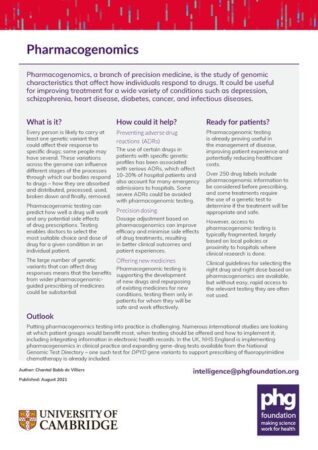Pharmacogenomics, a branch of precision medicine, is the study of genomic characteristics that affect how individuals respond to drugs. It could be useful for improving treatment for a wide variety of conditions such as depression, schizophrenia, heart disease, diabetes, cancer, and infectious diseases.
What is it?
Every person is likely to carry at least one genetic variant that could affect their response to specific drugs; some people may have several. These variations across the genome can influence different stages of the processes through which our bodies respond to drugs – how they are absorbed and distributed, processed, used, broken down and finally, removed.
Pharmacogenomic testing can predict how well a drug will work and any potential side effects of drug prescriptions. Testing enables doctors to select the most suitable choice and dose of drug for a given condition in an individual patient.
The large number of genetic variants that can affect drug responses means that the benefits from wider pharmacogenomic-guided prescribing of medicines could be substantial.
How could it help?
Preventing adverse drug reactions (ADRs)
The use of certain drugs in patients with specific genetic profiles has been associated with serious ADRs, which affect 10-20% of hospital patients and also account for many emergency admissions to hospitals. Some severe ADRs could be avoided with pharmacogenomic testing.
Precision dosing
Dosage adjustment based on pharmacogenomics can improve efficacy and minimise side effects of drug treatments, resulting in better clinical outcomes and patient experiences.
Offering new medicines
Pharmacogenomic testing is supporting the development of new drugs and repurposing of existing medicines for new conditions, testing them only in patients for whom they will be safe and work effectively.
Ready for patients?
Pharmacogenomic testing is already proving useful in the management of disease, improving patient experience and potentially reducing healthcare costs.
Over 250 drug labels include pharmacogenomic information to be considered before prescribing, and some treatments require the use of a genetic test to determine if the treatment will be appropriate and safe.
However, access to pharmacogenomic testing is typically fragmented, largely based on local policies or proximity to hospitals where clinical research is done.
Clinical guidelines for selecting the right drug and right dose based on pharmacogenomics are available, but without easy, rapid access to the relevant testing they are often not used.
Outlook
Putting pharmacogenomics testing into practice is challenging. Numerous international studies are looking at which patient groups would benefit most, when testing should be offered and how to implement it, including integrating information in electronic health records. In the UK, NHS England is implementing pharmacogenomics in clinical practice and expanding gene-drug tests available from the National Genomic Test Directory – one such test for DPYD gene variants to support prescribing of fluoropyrimidine chemotherapy is already included.

